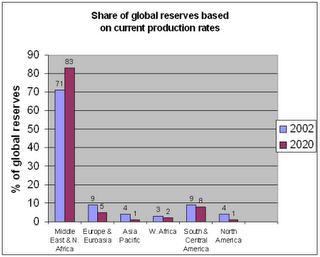 Our Middle East foreign policy has to do with United States' dependency on only certain countries in that region for oil. The presence or absence of oil in a country changes the way the U.S. views the country.
Our Middle East foreign policy has to do with United States' dependency on only certain countries in that region for oil. The presence or absence of oil in a country changes the way the U.S. views the country.What is the future of oil? The Institute for the Analysis of Global Security (IAGS) has a very useful website with interesting information about the world's oil reserves.
(Chart at left "Based on projection of 2002 production levels, BP Statistical Review of World Energy").
Where are the reserves? According to the IAGS,
Proved oil reserves are those quantities of oil that geological information indicates can be with reasonable certainty recovered in the future from known reservoirs. Of the trillion barrels currently estimated, 6% are in North America, 9% in Central and Latin America, 2% in Europe, 4% in Asia Pacific, 7% in Africa, 6% in the Former Soviet Union. Today, 66% of global oil reserves are in the hands of Middle Eastern regimes: Saudi Arabia (25%), Iraq (11%), Iran (8%), UAE (9%), Kuwait (9%), and Libya (2%).Recent headlines paint an enormously complex picture of the Middle East:
- Bush says yes, Egypt says no - Is our foreign policy to be about spreading democracy in the region?
- The UK is sustaining high casualties in Afghanistan. That beleaguered nation does not have any petroleum to use or sell, but is a narcotics economy by more than 50%, according to NATO's commander, General Jones.
- The Afghan/Pakistan/U.S. triangle challenge: deal with Taliban & opium trade. One of our most significant allies is Pakistan; it has no oil and strained relations with Afghanistan, one of the poorest nations in the world.
- The UK admits underestimating the Taliban; the radical Islamists continue to protect al Qaeda. Osama bin Laden remains at large somewhere near the border between Pakistan and Afghanistan.
- UN Secretary General Annan believes Iraq slides toward civil war; the U.S. is frustrated with Prime Minister Maliki's failure to control the militias - Iraq has plenty of oil reserves that are underutilized in the country's development, due to the current civil war.
- World opinion favors diplomacy, towards which Bush is now leaning. Iran's prime minister also sees progress - Iran has plenty of oil and the revenue produced is being put to some nefarious uses that could threaten the United States.
- U.S., Israel may have planned war in Lebanon and the Israeli PM defends his performance. Now Hizbollah in Lebanon vows to keep arms, and Hizbollah in Palestine may recognize Israel. Neither Israel nor Lebanon have oil and we allowed the war between Lebanon's Hizbollah and Israel to go on unchecked for weeks.
- The plot thickens as Israel may be giving military training to Kurds in northern Iraq, while remaining open to talks with Palestine's president Abbas. The "Quartet" backs his forming a "unity" government - Israel and Palestine, however, remain locked in a decades long struggle without the active diplomatic involvement of the United States.
- Several other mid-east countries remain off the news radar screen. Saudi Arabia's rulers have plenty of oil that they share with the world, but that has not made the country a democracy. Kuwait has a constitutional monarchy that is partly free. The UAE is a federation with specified powers delegated to the UAE federal government and other powers reserved to member emirates and is not a democracy. Libya is a military dictatorship that finally gave up pursuit of nuclear weapons after the invasion of Iraq and has relatively friendly relations with the U.S. as a result.
Thinking outside of the war box - Anti-poverty/development efforts make more sense than the military's destruction of countries' infrastructures. Geographically Iran sits right between Iraq and Afghanistan; it must be dealt with. Someday someone may think that Afghanistan is on the oil pipeline route of Iraq-Iran-to-China. Only the Himalayas stand in the way. Maybe construction workers, maintenance people and land for the pipeline could become Afghanistan's national resource. Meanwhile Afghanistan is the poppy pipeline to Europe.
Tags: Middle East Bush Islam Iran current affairs News news and politics Politics foreign policy
1 comment:
Post a Comment